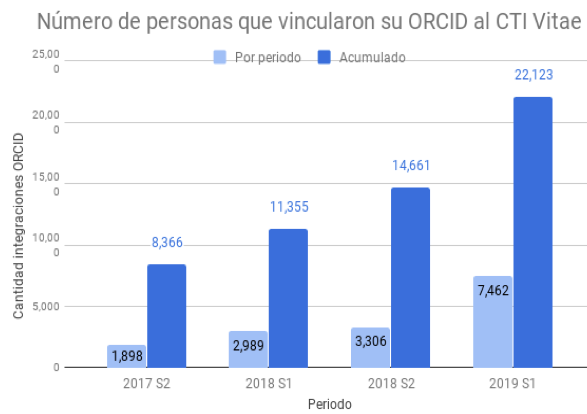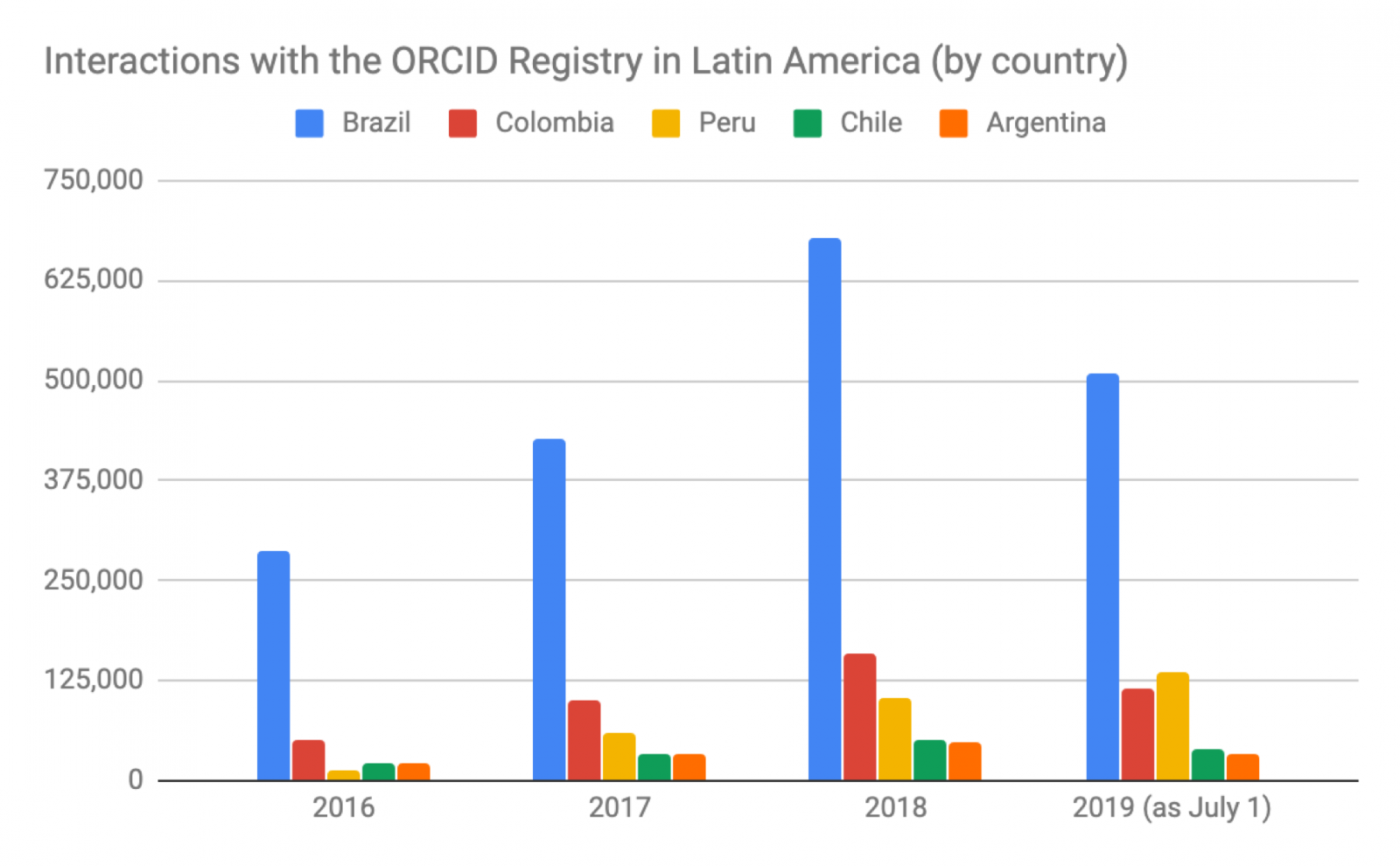It has been almost two years since our “Collect & Connect: Focus on Latin America” post, when we celebrated CONCYTEC’s achievements as a true ORCID pioneer as the first member in Latin America to be recognized in our Collect & Connect program! CONCYTEC is the Peruvian agency which purpose is to regulate, direct, guide, finance, coordinate, supervise and evaluate the country`s actions in Science, Technology and Technological Innovation, and to promote and drive its development.
Back then, around 8,000 Peruvian researchers had their ORCID iD connected to the national cv system, DINA (now CTI Vitae)1, and ORCID had the support of two member organizations: Universidad Peruana de Ciencias Aplicadas (UPC) and CONCYTEC.
Fast forward two years. CONCYTEC has integrated ORCID into the national CV platform, CTI Vitae, to which 22,000 Peruvian researchers have now connected their ORCID iD.
We have also welcomed five more organizations in Peru as ORCID members, in 2019: Pontificia Universidad Catolica del Peru, Universidad Andina del Cusco, Universidad Continental, Universidad Nacional Mayor de San Marcos, and Universidad Peruana Cayetano Heredia.
In addition, Peruvian users have been consistently amongst the top five countries to use the ORCID Registry over the past three years, a great indication of the benefit of ORCID to the community!


CONCYTEC and ORCID
CONCYTEC has been part of the ORCID community since 2015 and was the first Latin American governmental funding agency to integrate with ORCID. Their ORCID integrations with DINA (the national cv platform, now renamed CTI Vitae) and ALICIA (the national open access repository), allow researchers to import publications from their ORCID record to their CTI Vitae, and to export their contributions from ALICIA to their ORCID record. This means less administrative burden for Peruvian researchers and increased international visibility for local research.
“ORCID is an element of first importance for the national and international interoperability of the National Information Network in CTI’s systems, and to increase the visibility of Peruvian researchers”. Knowledge Evaluation & Management Office (DEGC) – CONCYTEC
The PeruCRIS project
The PerúCRIS project aims to establish, develop, and operate the country’s National Information Network on Science, Technology and Technological Innovation in CTI, which will allow the consolidation and management of scientific and academic information throughout Peru. It will also enable the generation of statistics to support decision-making – at the institutional, regional, sectoral, and national levels – in addition to making the activities, capacities, and scientific production of Peruvian researchers globally visible.
Building the National Information Network in CTI requires the incorporation of best practices in the research information management. To achieve this goal, CONCYTEC has established strategic alliances with key institutions in the international open science community — DURASPACE, euroCRIS, LA Referencia, COAR, and ORCID.
Campaign for ORCID Adoption
In October 2018, CONCYTEC launched a campaign for national adoption of ORCID as the unique persistent identifier for researchers at the national level. This means that all Peruvian researchers will have an ORCID iD. The project also involves:
- ORCID integration. Authenticated sign-in to CTI VItae through ORCID, plus the ability to import and export publications to and from ORCID and CTi Vitae

- ORCID training. CONCYTEC has been actively reaching out to Peruvian research institutions to share ORCID`s best practices for researchers and organizations. This approach includes visits and on-site training, dedicated webinars and general webinars. ORCID has been working since 2018 with CONCYTEC on a series of webinars for researchers and organizations, continuing through 2019. To see more information, including a calendar of activities and videos, or to register for an upcoming webinar, visit Talleres ORCID
- Institutional affiliation and affiliation coordinator. This functionality enables institutions to monitor their researchers’ ORCID registration and thus track the progress of ORCID adoption
Partnership
In July last year, CONCYTEC organized the First Meeting of STI Information Managers, bringing together representatives from 141 public and private Peruvian universities, and 25 public research institutions. Speakers from key Latin American and European organizations related to STI information management, including La Referencia, ORCID, EuroCRIS, 4Science, DuraSpace, CINECA, and others shared technology updates, as well as standards and best practices in the field.
A few months later, in October, CONCYTEC and ORCID co-sponsored a one-day workshop at Universidad ESAN, where we shared progress to date and future plans with the community. Representatives from two ORCID members in the region — Universidad Autónoma San Luís Potosí (Mexico) and Universidad Peruana de Ciencias Aplicadas (Peru) — also shared their experiences of implementing ORCID
During 2019, CONCYTEC and ORCID are running a series of joint webinars for researchers and for research institutions, explaining the benefits of ORCID membership, and both organizations will also be at the Latmetrics conference, in Cusco this November.
Learn more about ORCID and CONCYTEC in this great video CONCYTEC prepared about our work together!
Universidad Peruana de Ciencias Aplicadas: a precursor
UPC was one of our first members in Latin America, and the second in Peru, joining ORCID in 2016. One of UPC`s first actions was to integrate ORCID with the institutional digital repository, making it mandatory for all researchers depositing thesis and dissertations to have and share their ORCID iD, and facilitating for authors to register their works. This included the production of campaigns and material to facilitate the creation of ORCID iDs by researchers.
As a result, today UPC has more than 2,000 researchers with an ORCID iD, which allowed the following actions:
- Adoption of a unique identifier for users in the digital context of the University;
- Standardization of user names when registering information in academic and research information systems;
- Generation of an organizational culture that allows users to maintain a unique way of registering the authorship of their work.
- UPC`s scientific publications developed a policy of including author`s ORCID iDs.
Libio Huaroto, Head of Repositories at UPC, a repositories management expert, and an ORCID enthusiast told us:
“Undoubtedly, the incorporation of ORCID and other identifiers in academic and editorial processes of the University have improved research work, facilitated its dissemination and improved tracking.”
With all the great progress being made, we are very happy to continue working on building an ORCID community in Peru, and helping to create our second consortium in Latin America!
1 Source: CONCYTEC (https://perucris.concytec.gob.pe/adopcion-orcid)
